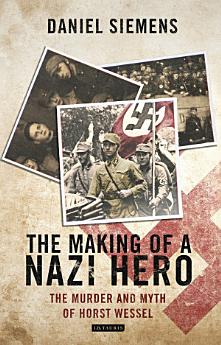The Making of a Nazi Hero: The Murder and Myth of Horst Wessel
Feb 2013 · Bloomsbury Publishing
Ebook
336
Pages
reportRatings and reviews aren’t verified Learn More
About this ebook
On 14 January 1930, Horst Wessel, a young and ambitious member of the SA was shot at close range at his home in Berlin. Although the crime was never completely solved, the murder was most likely committed by a group of communists with close ties to the city's gangland. Wessel later died from his injuries. Joseph Goebbels, whose attention had already been drawn to Wessel as a possible future Nazi leader, was the first to recognize the propaganda potential of the case. 'A young martyr for the Third Reich' he wrote in his diary on 23 February 1930 immediately after receiving the news of Wessel's death. This was the beginning of the myth-making that transformed an ordinary individual into a masculine role model for an entire generation. Two months later, thousands of people lined the streets for Wessel's funeral parade and Goebbels delivered a graveside eulogy. In the years that followed - and as Nazi power increased - Horst Wessel became the hero of the Nazi movement - with his elaborate memorial quickly becoming a site of pilgrimage.
The song Die Fahne Hoch for which Wessel had written the lyrics (and which subsequently became popularly known as the Horst Wessel Song) became the official Nazi party anthem and the Berlin district of Friedrichshain, where Wessel was murdered was renamed Horst-Wessel-Stadt in his honour. Numerous biographies and films followed. Using previously unseen material, Daniel Siemens provides a fascinating and gripping account of the background to Horst Wessel's murder and uncovers how and why the Nazis made him a political hero. He examines the Horst Wessel 'cult' which emerged in the aftermath of Wessel's death and the murders of revenge, particularly against Communists, committed by the SA and Gestapo after 1933. At the same time, the story of Horst Wessel provides a portrait of the Nazi propaganda machine at its most effective and most chilling.
The song Die Fahne Hoch for which Wessel had written the lyrics (and which subsequently became popularly known as the Horst Wessel Song) became the official Nazi party anthem and the Berlin district of Friedrichshain, where Wessel was murdered was renamed Horst-Wessel-Stadt in his honour. Numerous biographies and films followed. Using previously unseen material, Daniel Siemens provides a fascinating and gripping account of the background to Horst Wessel's murder and uncovers how and why the Nazis made him a political hero. He examines the Horst Wessel 'cult' which emerged in the aftermath of Wessel's death and the murders of revenge, particularly against Communists, committed by the SA and Gestapo after 1933. At the same time, the story of Horst Wessel provides a portrait of the Nazi propaganda machine at its most effective and most chilling.
About the author
Daniel Siemens is an historian of Weimar and Nazi Germany and DAAD Francis L. Carsten Lecturer in Modern German History at the School of Slavonic and Eastern European Studies (SSEES), University College London.
Rate this ebook
Tell us what you think.
Reading information
Smartphones and tablets
Install the Google Play Books app for Android and iPad/iPhone. It syncs automatically with your account and allows you to read online or offline wherever you are.
Laptops and computers
You can listen to audiobooks purchased on Google Play using your computer's web browser.
eReaders and other devices
To read on e-ink devices like Kobo eReaders, you'll need to download a file and transfer it to your device. Follow the detailed Help Center instructions to transfer the files to supported eReaders.





